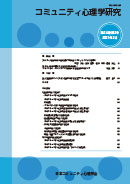
- Issue 2 Pages 81-
- Issue 1 Pages 1-
- |<
- <
- 1
- >
- >|
-
Masato MIYOSHI, Kouki MORIMOTO, Yuri HASHIMOTO, Shinya TANIBUCHI2021Volume 24Issue 2 Pages 81-94
Published: March 31, 2021
Released on J-STAGE: April 30, 2022
JOURNAL FREE ACCESSProcesses of Single alcoholics’ commitment to Danshukai were investigated. Danshukai is a self-help group for people that want to quit alcohol. Generally, middle-aged men have participated in Danshukai over the long term with their wives, and express feelings of atonement for the wives. However, recently, the number of participants without their spouse has been increasing. Therefore, it is necessary to examine factors related to the new type of participants’ commitment to Danshukai, which is a social resource for dealing with alcohol use disorders. Interviews were conducted with single participants in Danshukai who have overcome alcohol use disorders (N=10) about the episodes related to their commitment to Danshukai, and the data were analyzed using the Modified Grounded Theory Approach. The results indicated 17 concepts and 6 categories. At first, single participants became aware of their uniqueness through “approaches from senior members”. Moreover, they had “difficulties because they were a minority”. Then, they tried to “model themselves after” other participants. Developing “a spread of connection” and gaining “the position of helpers” were mentioned as factors that stabilized commitment. “Continuous participation in Danshukai” was achieved through the above experiences. Correlations between single participants’ experiences and findings related to self-help groups are discussed.
View full abstractDownload PDF (648K) -
Mari YOSHINAGA2021Volume 24Issue 2 Pages 95-113
Published: March 31, 2021
Released on J-STAGE: April 30, 2022
JOURNAL FREE ACCESSDisaster prevention education is an essential part of education for junior high school students. Therefore, it is important to examine the methodology to enhance their understanding, judgment, imagination and independence regarding disaster prevention. This study examined the effectiveness of a methodology for disaster prevention education in a community in the Tokyo metropolitan area, which includes Practices 1 and 2. Practice 1 (n=33) is an annual disaster prevention education activity as part of a community development program, and is a type of simulation drill to experience the actual evacuation process. On the other hand, in Practice 2 (n=248), a young man with disaster experience gave a lecture at a junior high school. In Practice 1, the awareness of community empowerment was increased through the simulation-type exercise, and in Practice 2, the self-efficacy of the role of self-reliant action in disaster management was increased by listening to the youth’s experience of disaster and recovery. In conclusion, it was found that working with community members on an ongoing basis to educate junior high school students on disaster prevention increased their interest in and sense of participation in the community, while interacting with their peers who had been affected by the disaster increased their sense of self-efficacy to play a role in disaster management.
View full abstractDownload PDF (1111K)
-
Yuji SAKASHITA2021Volume 24Issue 2 Pages 114-136
Published: March 31, 2021
Released on J-STAGE: April 30, 2022
JOURNAL FREE ACCESSIn this study, I reviewed past research conducted in Japan on support approaches for preventing burnout in human services professionals, with the aim of ascertaining research trends and examining future tasks and challenges. I was able to classify such burnout prevention support approaches into the following five types according to their qualitative content: (1) support in solving work-related problems, (2) promotion of understanding of the self, (3) enhancement of interpersonal support skills, (4) support through dialogue, and (5) promotion of self-care. Regarding the effects of intervention, moreover, a qualitative analysis found ‘catharsis through active listening,’ ‘solving of work-related problems,’ and ‘activation of objectivity’ to be effective in preventing burnout, while a quantitative analysis suggested support approaches to have a limited effect in preventing the typical burnout symptoms of ‘sense of emotional exhaustion’ and ‘depersonalization.’
Therefore, as future tasks and challenges, in addition to verification of effects of ‘catharsis through attentive listening,’ ‘solving of work-related problems,’ and ‘activation of objectivity,’ using quantitative analysis, as well as verification of effects against ‘emotional exhaustion’ and ‘depersonalization,’ I propose that clinical knowledge and findings that have been gained in previous burnout studies be incorporated into the current support approach.
View full abstractDownload PDF (594K)
- |<
- <
- 1
- >
- >|